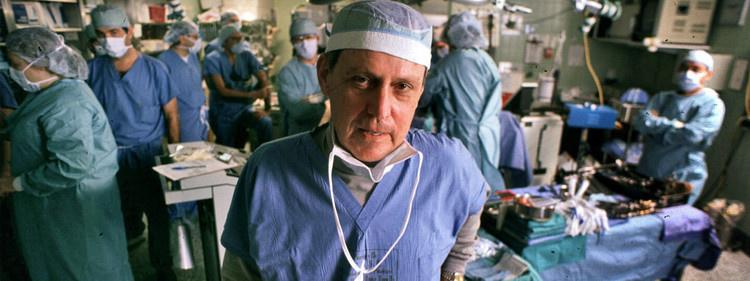‘Burden of Genius’ showcases revolutionary Dr. Thomas Starzl


The documentary “Burden of Genius” tells the story of Dr. Thomas Starzl, who is known as “the father of transplantation.”
Students at the University of Pittsburgh have likely heard the name Dr. Thomas Starzl at least once in passing or happened across the statue of him relaxing on a bench behind the Cathedral. But unless you are a pre-med student or really steeped in Pittsburgh-related trivia, that name is probably just another whisper of some famous person who stepped foot in the vicinity of Cathy’s towering visage long ago.
The documentary film “Burden of Genius” — directed by Tjardus Greidanus and co-produced by his wife Laura Davis and Pitt film professor Carl Kurlander — premiered almost exactly a year after Starzl passed away in March 2017, at the 2018 Cinequest Film Festival. The movie provides an excellent means to better get to know Starzl’s significance to the University. The film held its first public screenings in Pittsburgh from April 12-18 at the Carnegie Science Center, with showings at 4 p.m. and 7 p.m.
“Burden of Genius” chronicles the incredible story of the late medical pioneer and his journey into the controversial field of organ transplantation, where he would change the face of surgery and immunotherapy. His innovations would help transform Pittsburgh from a steel city to a capital of medical innovation.
Often called “the father of transplantation,” Starzl performed the world’s first successful liver transplant in 1967. But it wasn’t until he came to the University of Pittsburgh in 1981 that he was able to perfect what was still considered an experimental procedure.
Before Starzl, organ transplants were the stuff of science fiction. Starzl’s career in organ transplants was mired in controversy, as critics accused him of blindly seeking ambition and playing God.
“When Dr. Starzl first came to Pittsburgh,” Kurlander said, “there was a petition of 50 people, faculty and medical students, saying we don’t want you here, you’re a ghoul, you’re stealing organs.”
Despite these setbacks and more, Starzl pushed himself and his team of surgeons to their limits to develop the transplantation procedure and in the process saved thousands of lives and helped elevate the University of Pittsburgh Medical Center to the fame it holds today.
“So I think it’s very important that the public at large sees this so it’s not just the people in the community,” Kurlander said.
“Burden of Genius” is the third film created by the collaborative team of Kurlander, Greidanus and Davis, and unlike the other two was also backed by the University of Pittsburgh.
“Pitt was the one who ultimately supported the movie and it’s a University of Pittsburgh production, so it’s really a breakthrough for Pitt to do this,” Kurlander said.
Greidanus explained that the driving force behind the film began when he and Kurlander interviewed Starzl briefly for a 2008 film about Pittsburgh, “My Tale of Two Cities,” which focuses on the City’s quest to reinvent itself. After the team made “The Shot Felt ’Round the World,” a 2010 documentary about Dr. Jonas Salk, a Pitt professor who invented the polio vaccine, Greidanus was looking for another Pittsburgh hero.
“We were thinking ‘Who else is somebody who is really changing landscapes?’” Greidanus said. “And of course Dr. Starzl is not as well known by laypeople, but in the medical community, he’s like Steve Jobs, you know?”
According to Kurlander, it took five years for them to get Starzl to even agree to the documentary.
“The truth is, I went to Dr. Starzl and asked him if we could do a documentary, and he looked at me and said no,” Kurlander said. “And I kept bugging him.”
After Kurlander and Greidanus’s Salk movie “The Shot Felt ’Round the World” earned some popularity and ended up playing on the Smithsonian channel in 2013, Starzl agreed to a meeting and then the documentary. This started a three-year process of getting interviews, acquiring archival footage and editing to make “Burden of Genius.”
Greidanus and Davis interviewed Starzl for 15 hours across the span of a week in 2014. They also interviewed some of Starzl’s colleagues and Starzl’s wife Joy and put together a sizzle reel — a short promotional video — in order to raise the rest of the funding for the film.
On Starzl’s 90th birthday in March of 2016, people Starzl had worked with and trained came to Pittsburgh from all over the world to celebrate his birthday, so they managed to get interviews they never could have otherwise. Some of the guests were surgeons from other countries who Starzl had trained, and who then returned home to open up transplant centers of their own.
“We did a marathon of interviews that weekend, around his birthday, and we ended up with about 70 hours worth,” Greidanus said. “Probably 30 hours of archival footage. And then I just started going through every interview. I allowed myself to watch everything once, and every time that I was watching it, I would pull things I thought I could use. And I would just throw that into a big long timeline, you know, and put it in a certain kind of order.”
The power of “Burden of Genius” was one that not even colleagues of Starzl could have anticipated.
“When they saw the movie they weren’t even prepared for the power of how incredibly hard and persistent it was to get this done and keep going,” Kurlander said.
Greidanus and Kurlander hope that audiences will be inspired by Starzl’s story, regardless of if they are part of the medical community or not.
“[Organ transplantation] really had a kind of stigma to it, so I think it’s an incredibly inspiring story as far as just seeing the drive of this guy,” Greidanus said. “He just had a titanic intellect and an incredible drive. What can be accomplished with that kind of persistence! He just never, never quit.”
Carly Motz, a nurse at Allegheny General Hospital, went with her mother to see “Burden of Genius” at the Carnegie Science Center on Tuesday afternoon, not really knowing what to expect.
“I actually really enjoyed it,” Motz said. “Because it showed the pure dedication he had to the transplants, finding that it’s something there’s not that much research on it and dedicating his entire life to it. That’s pretty awesome, to see how they went in-depth about it.”
Motz admired that the documentary went into every detail of Starzl’s life and his personal sacrifices to save so many people.
“[It shows] the true impact on his family life and the impact it shows on just the U.S. in general, how many people he and his team have helped,” Motz said. “And they pretty much just sacrificed their lives for millions of others.”
Recent Posts
SGB addresses concerns about ICE presence on campus, hears SJP lawsuit against administration, approves governing code bill
At its weekly meeting on Tuesday at Nordy’s Place, Student Government Board heard concerns about…
ACLU of Pennsylvania sues Pitt over SJP suspension
The ACLU of Pennsylvania filed a federal civil lawsuit against the University of Pittsburgh and…
Marquan Pope: The ultimate shark
One of the most remarkable things about sharks is that an injury doesn’t deter them.…
Who Asked? // Do we really get a summer vacation?
This installment of Who Asked? by staff writer Brynn Murawski mourns the seemingly impossible perfect…
Notes From an Average Girl // Notes from my junior year
In this edition of Notes From an Average Girl, senior staff writer Madeline Milchman reflects…
Meaning at the Movies // The Power of the Movie Theater
In this edition of “Meaning at the Movies,” staff writer Lauren Deaton discusses her love…


